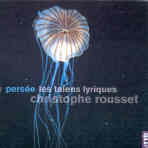The plot of this opera concerns Perseus and his love for Andromeda (who returns his love but feels duty-bound to Phinée as well), Mérope’s own love for him, and his killing of the snake-headed gorgon, Medusa, in order to impress Andromeda. Lully clearly meant the heroic Perseus to stand for Louis XIV, who commissioned the work, and indeed while Persée is not on stage all the time, he is the central character of this lengthy, ceremonial opera. Perseus doesn’t even appear until the second act, and when he enters it is not to great fanfare but to an understated continuo riff, as if true royalty needs no great introduction.
Paul Agnew sings Perseus with great dignity, using his high, light tenor with regal grace and intelligent focus (pitch used here is A=394; I’d love to hear this sung at A=440). Unusually for Lully, the chorus often takes center stage, particularly late in the work (the fourth act is almost entirely comprised of dueling choruses of Ethiopians and Tritons), and the choral parts are wonderfully textured and exciting, actually adding action to the drama. The most telling dramatic role is that of Andromeda, and Anna Maria Panzarella makes her a truly flesh-and-blood character. Some of the finest singing, however, comes from bass Jerome Correas as Phinée, who finds Perseus’ boasting a bit much. Indeed, all of the performances are first-rate, and Christophe Rousset and his band play gorgeously and with great energy. The recording is from a live performance, and occasional stage noises intrude.
When all is said and done, there’s more here to appreciate than truly enjoy; Lully’s orchestration is surprisingly sparse, and while you don’t expect any truly meaningful drama to emerge, this has the whiff of a museum piece. There’s nothing wrong with museum pieces, by the way, but it’s good to know that’s what you’re getting.
































